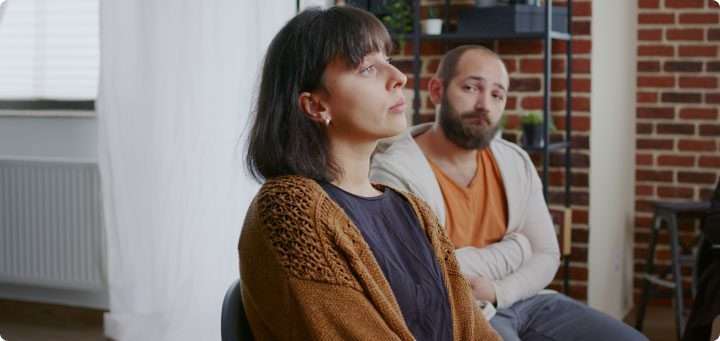 Success Rate:
Read Now
Success Rate:
Read Now
 Success Rate:
Read Now
Success Rate:
Read Now
The Canadian Centre for Addictions offers specialized relapse prevention therapy. Contact us to learn more about our structured relapse prevention program designed for recovering addicts.

The possibility of relapse is a reality recovering addicts have to face on their journey to sobriety. Addiction is a chronic disease, and relapse is often a part of the recovery process for most people. Studies show that over 40% to 60% of people with substance use disorder relapse after treatment. Having a relapse does not mean you’re not trying hard enough or that your treatment has failed. Rather, it means you need to take extra precautions to prevent it from happening again.
No one plans to return to using a substance they’ve decided to quit. However, the will to remain abstinent is often insufficient to prevent a person from relapsing. So, it is necessary to include a relapse prevention strategy in your rehab program. Discover the Canadian Centre for Addictions’ relapse prevention program and therapy for individuals recovering from addiction.

Relapse prevention is any structured plan that aims to prevent or limit relapses by helping recovering addicts anticipate and recognize circumstances that are likely to trigger a relapse. Any strategy devised to cope with these high-risk situations is known as a relapse prevention plan.
As part of a relapse prevention plan, the recovering addict learns that certain emotions, feelings, and circumstances will provoke cravings for the addiction they’re trying to overcome. They also learn to be alert for these warning signs and have an action plan for dealing with them.
The purpose of relapse prevention therapy is to help prevent or limit the effects of relapse by equipping recovering addicts to identify and overcome situations that make them vulnerable. Relapse prevention also helps recovering addicts view relapse from a healthy perspective. People who suffer relapse may view themselves as failures and grow doubtful of their ability to recover. This type of thinking is counterproductive and can even cause the individual to return to old habits. However, relapse prevention teaches them to interpret slip-ups as opportunities to improve their coping skills. It also helps to minimize any harm that can arise from relapse and get the individual back on the recovery path as quickly as possible.
You need experienced help for relapse prevention because the determination to maintain abstinence from substance use is often inadequate. Without a structured relapse prevention program, it’s usually a matter of time before you encounter triggers and give in to your cravings. In a professional relapse prevention plan, you will work with a specialist to assess scenarios that might make you vulnerable to substance abuse and design clear strategies to avoid or work around these scenarios.
Some people may consider a relapse prevention plan unnecessary or even an example of negative thinking. However, this is not the case, as having a plan shows you are aware of the risks of want to be prepared to handle them. A relapse prevention plan could also be life-saving as it typically involves a person who can call for medical help if needed.
If you or a loved one is recovering from an addiction, the Canadian Centre for Addictions is here to help. We offer relapse prevention therapy that gives you or your loved one the best chance at remaining sober. Our centre with luxury amenities is in a serene location, away from the temptations and stresses of the city.

Contrary to popular thinking, relapse is not a quick, situational occurrence in which a recovering addict uses their substance of choice. Relapse is a slow process that can occur over a few hours to weeks. It happens in three stages, and awareness of these stages can help you prevent relapse before they occur. The three stages of relapse are emotional, mental, and physical.
The first stage of relapse is emotional. At this point, the recovering addict is not thinking of using and is determined to maintain the sobriety they’ve achieved during rehab. However, the issues that led to their substance abuse in the first place are still present, and these could be setting them up for the next stages of relapse. The individual is emotionally vulnerable at this point, and they may exhibit warning signs such as:
It’s crucial to recognize this stage of relapse to prevent progression to the next. Denial and the fear of judgment are prominent features of emotional relapse. Many people do not share how they’re feeling at this stage, and keeping it all in will leave you exhausted and wanting to escape. Being able to self-reflect and answer the following questions can help you avoid getting stuck in the emotional stage of relapse:
If you ignore the signs of emotional relapse, it’s only a matter of time before you transition to the next stage. Mental relapse is a stage of internal conflict where one part of you wants to remain sober while the other wants to use drugs or alcohol again. You may start to fantasize or find justifications for using again.
Individuals in the mental relapse stage will also start to bargain; this means they will begin to imagine scenarios where drug or alcohol use may be acceptable. They may permit themselves to use on holidays or special occasions. They may also consider relapsing periodically, like using once a month or twice a year. Bargaining may also involve switching an addiction to another.
As an individual spends more time in the mental stage, their resistance will weaken while the need to escape becomes stronger. The signs of the mental relapse stage include:
Some strategies for getting through the mental relapse stage include:
Consider the cost of giving in to your urges and whether it’s worth it. The answer is that it is not. If you allow your cravings to get the better of you, chances are you may not be able to stop, and you’ll be trapped in the cycle of addiction you’ve been working hard to escape.
Avoid worrying about whether you can go without using ever again. Your focus should be on getting each day, one at a time.
Speaking to someone you trust about how you feel has a calming effect. You will notice that your cravings become less overwhelming the more you express yourself.
Stress and tension make you irritable, angry, and more likely to seek an escape. You are more rational and likely to make decisions that do not involve substance use when relaxed. Meditation, deep breathing, and mindfulness are some relaxation techniques that can help you overcome your cravings.
Urge surfing is a mental technique that involves watching your urges without engaging in them. Most urges last 10 to 30 minutes, and while this may seem long, they will dissipate if you find a way to keep yourself busy or distracted.
Physical relapse is the stage where your defences crumble, and you use the substance. You will inevitably get to this point if you don’t address the issues of the emotional and mental stages. A single use of the substance (a slip or lapse) does not necessarily mean you’ve suffered a relapse. However, you must quickly seek help to avoid entering a new phase of active addiction.
People in the emotional or mental stage of relapse can avoid physical relapse using the following strategies.
Having someone around when you feel your cravings overpowering you can help prevent a scenario where you eventually use drugs or alcohol.
Going away to a place that does not remind you of your addiction for a few days or weeks might get you out of your mental or emotional relapse phase. Ensure someone knows where you are if you decide to move.
You can call your rehab centre for readmission if you feel overpowered by your cravings. You don’t need to wait until you use before returning to a rehab facility or relapse prevention centre.
Unfortunately, it’s still possible to suffer a physical relapse despite your best efforts. If this happens, there’s no need to beat yourself up or feel like a failure. Recovery is a journey, and there are usually bumps on the way. Understand that you’re dealing with an illness, and relapse is only a flare-up that you can and should deal with decisively.

Anyone in recovery is at risk of relapse, but some factors can increase relapse risk.
Coping with stress is one of the primary reasons people turn to substances and relapse when trying to get sober. Stressful situations trigger and intensify urges, especially if the drug was used as a previous coping mechanism. Finding healthier ways of relieving stress makes it easier to manage cravings when they come.
Individuals with co-occurring mental health problems may return to drug use if the symptoms of the illness become too unpleasant. People with mental health problems may self-medicate with drugs, so addiction treatment should include health services for co-occurring disorders. It’s easier to manage urges when you don’t have to deal with the symptoms of other health issues.
You are more likely to relapse if you don’t have or deviate from an established routine. You’re less likely to have time to think about your cravings when you have a daily routine. Straying from your routine will push you towards drug use.
Individuals who are exposed to people, places, and circumstances connected to their addiction are more vulnerable and likely to relapse. It’s vital to have effective ways of handling these situations when they arise. So if a friend asks you to go out or there’s a celebration at work that involves your triggers, you should have a specific answer ready.
Recovering addicts on the path to sobriety may expect so much when they quit and feel disappointed when things don’t go as planned. Having unrealistic expectations can lead to dissatisfaction which triggers relapse. Understand that recovery takes time, and you may even require more time to get your life to how it was before drugs.

Professional relapse prevention equips participants with the skills to navigate the challenging periods on the road to recovery. Relapse prevention programs offer the following benefits:
Individuals who participate in relapse prevention programs develop the capacity to recognize high-risk situations that make them vulnerable. They become able to identify triggers early and initiate strategies to avoid or work around them.
Relapse prevention programs equip participants with the coping skills required to deal with situations that can trigger drug use.
Relapse prevention programs help participants to build confidence and self-esteem. They learn that their addiction does not define them and that recovery is possible. Participants also get to understand what relapse is and that relapsing does not imply failure.
Relapse prevention programs help participants to modify the beliefs and thinking patterns that led to addiction in the first place. They understand why they started using drugs and learn new ways to ease stress and other factors fueling drug use.

Addiction counsellors create relapse prevention plans to meet the specific needs of recovering addicts. You can create your own relapse prevention plan by following this general process:
Understanding your relationship with your drug of choice is the first step to creating an effective relapse prevention plan. You should know the periods you were more prone to using, triggers, and thought patterns that led to relapse.
What were the warning signs for your last relapse? You should think of how you felt and behaved when you relapsed. This list provides insight into your addiction and equips you to react better.
Your action plan is a list of steps you’ll take when you face a difficult situation instead of turning to drugs. This plan should be as detailed and specific as possible. It will include information like who to call, what to do, or where to go when you notice your warning signs. The people on your list should know what you’re doing and be willing to help.
A relapse prevention plan is any structured plan that aims to prevent or limit relapses by helping recovering addicts anticipate and recognize circumstances likely to trigger a relapse.
The four D’s in relapse prevention are:
Delay for a few minutes and the urges will pass.
Lower your stress levels by taking deep breaths while focusing on the rise and fall of your breathing.
Distract yourself from your urges by doing something to take your mind away from your cravings. Take a walk, read a book, flip the channels, or anything to forget about using for now.
Don’t get caught up in panic, thinking you cannot succeed or beat the urges. Challenge your thoughts to be positive. Repeat positive statements like “I’m fine, I’m getting better” to focus your mind in your desired direction.
The nine-step relapse prevention plan is a model developed by Terry Gorski for relapse prevention. The nine steps are:
Physical, psychological, and social stabilization
Completing a self-assessment
Educate yourself on warning signs and how you can prevent them
Identifying warning signs for when you’re likely to relapse
Managing warning signs effectively
Reviewing your recovery plan
Acknowledging when things go wrong
Involving others to help you on your recovery journey
A comprehensive follow-up plan
The three P’s of recovery are
Know why you’re in recovery
Practice makes perfect. Recovery is a long journey; you must practice your new thought patterns and coping skills until you master them.
Recovery is only successful when you’re persistent. Take what you have learned in rehab into account and continue to implement this knowledge in the future.
The best way to prevent relapse is by getting into a professional relapse prevention program. Such a program equips you with the skills to recognize and overcome situations that put you at risk.
The top three factors that contribute to relapse are stress, exposure to triggers, and untreated co-occurring health disorders.
Contact Us
Start Getting Better Now
Fill out the below form and get in touch with
a treatment specialist who can help